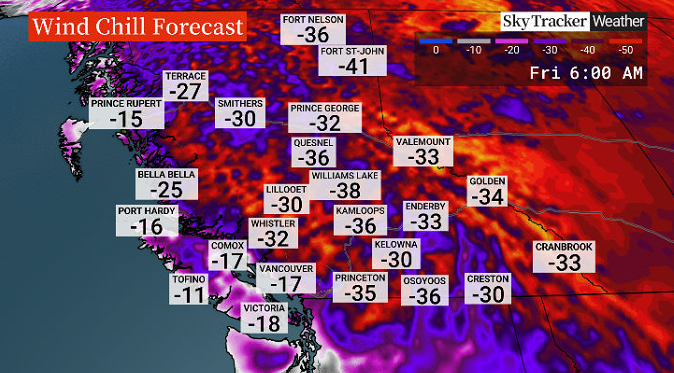British Columbians are being warned that a large Arctic outflow and extreme cold is going to be hitting most of the province on Thursday.

Temperatures are expected to plummet into the negatives, spurring officials to warn of waning driving conditions and home warming issues and to announce the opening of cold shelters.
In Northeast B.C., temperatures are expected to feel like -50 C with the wind chill. In the B.C. South Coast, it is expected to feel like -20 C to -30 C with the wind chill Thursday night. In the Prince George region, it is expected to feel like -35 C to -40 C. In the North Coast region, it will feel like -20 C to -30 C and in the Okanagan region it will be feeling between -25 C and -35 C.

In B.C.’s South Coast, the wind has been whipping up, leading to some concerns about flooding as well. Vancouver Park Board is prepared to shut down parts of the Stanley Park Seawall.
“Large waves due to strong northwest winds, storm surge and seasonably high tides have the potential to produce high water levels on Thursday morning,” Environment Canada said.
“Coastal flooding is possible along exposed shorelines, especially in low-lying areas.”
The Artic outflow is expected to last until Saturday, according to Environment Canada.
Cold shelters are opening in municipal areas, and community members are encouraged to check with their local governments for exact details.
Frostbite and hypothermia can occur within minutes if adequate precautions are not taken when outdoors, officials said.

Get weekly health news
Vancouver Coastal Health medical health officer Michael Schwandt spoke with Global News on Wednesday.
“We know there is an increased risk of frostbite or hypothermia for people who are spending longer periods of time outdoors,” he said.
Seniors, children, outdoor workers and the homeless are particularly at risk from the cold, he said.
Schwandt said emergency rooms typically see an uptick in people injured from slips and falls during cold weather, and urged people to be prepared for icy walkways.
Bitterly cold weather along some of B.C.’s most travelled routes has prompted a warning from the national weather agency.
Environment Canada issued an extreme cold warning for the Coquihalla, from Hope to Kamloops, the Okanagan Connector and the Trans Canada Highway, from Eagle Pass to Rogers Pass, where the wind chill will make it feel like -35 C.
“An extremely cold arctic ridge is building over B.C. and pushing south,” reads the warning.
Temperatures between – 25 C to -30 C in combination with winds of 30 gusting to 50 km/h with create dangerous wind chill values near –35 beginning Thursday night.
Travellers are being warned they may also experience episodes of blowing snow that reduce visibility.
The conditions are expected to improve by Friday as the winds diminish.
The City of Vancouver said its already activated its winter weather response protocol, with its full fleet of trucks deployed to brine streets in anticipation of ice and possible snow.
“Once the snow starts to fall then those same vehicles that are out monitoring the street conditions that are putting down brine and salt, they put their plows down,” said manager of street operations Amy Sidwell.
Sidwell urged people to leave extra time for their trips, and if they aren’t comfortable driving in winter conditions, to leave their car a home.
“When there is snow on the road it can take a bit of time for our crews to get to every surface so we are trying to make sure that people are driving for the conditions, driving slower, leaving more time for their trips, using transit where possible or avoiding trips all together and looking at, ‘Do I need to make this trip today?’” she said.
Sidwell also reminded Vancouver residents to have snow shovels and salt ready, and that they are required under city bylaws to clear their walkways by 10 a.m. the morning after a snowfall.
Vancouver Fire Rescue has also issued a warning, which can be applied to most of B.C.
It said residents need to be aware and cautious of how they are heating their homes.
— With files from Simon Little








Comments
Want to discuss? Please read our Commenting Policy first.